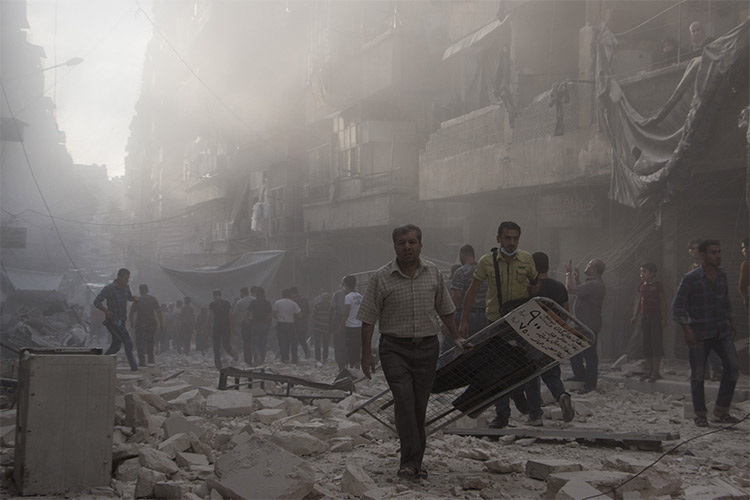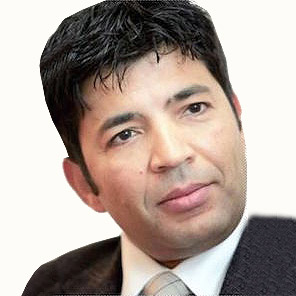Last week, the Syria crisis became the central focus of the international agenda and was the key issue discussed at the 70th UN General Assembly. Just before Russia launched its first air strikes in Syria, journalist Elena Servettaz spoke with political analyst and Arab world expert Hasni Abidi, director of the Geneva-based Study and Research Center for the Arab and Mediterranean World, about the consequences of Moscow’s support for Bashar Assad.

On September 30, Russia launched its first air strikes in Syria, allegedly targeting ISIS-linked bases. Photo: Karam Almasri / NurPhoto via ZUMA Press / TASS
Elena Servettaz: What is President Vladimir Putin looking to achieve in Syria?
Hasni Abidi: The Russian strategy has three elements to it. First, there is the element of domestic politics. Even if Putin has disappointed many people with his actions, within Russia he maintains his popularity. And in some respects, this popularity is a result of Putin being ideologically and strategically opposed to the West. [Putin and the West differ on] what happened in 2008 in Georgia, what happened in Libya three years later, and what is going on now in Ukraine. Moscow never fails to seize an opportunity, and Russia’s attitude toward the U.S. is exploited extensively inside the country. The second aspect is that Russia has always had problems with the Islamic or jihadist threat. Moscow still remembers well what happened in Chechnya. This means that any power representing a security threat to Russia must be stopped. And finally, the collapse of the Syrian regime will spell the end of Russia’s presence in the Mediterranean region, which Moscow has always sought access to. The collapse of Bashar Assad’s regime would mean the loss of the Tartus naval base for the Russians, and this base plays a key role in dealing with the deployment of the United States Sixth Fleet. This is why [the Russian government] wants to feed this crisis as long as possible—to play the Syria card, or Assad card, in both foreign affairs and inside Russia.
ES: Russian authorities claim that they want to stop ISIS’s progress on the ground. The United States and France support the idea of air strikes against ISIS. What is Putin’s plan to fight the militant group? Can Russia succeed with just air missions, without putting boots on the ground, or will it combat ISIS in some other way?
HA: I do not think that Moscow will bring in troops. The Russian authorities want to extend the life of [Assad’s] regime and then make a deal. It is, in fact, impossible to win the war against ISIS by sending troops into Syria. We don’t know exactly where ISIS is. It will be very difficult to identify which fighters are from ISIS and which are from the Al-Nusra Front [the Al-Qaida affiliate in Syria—ed.] or from the Free Syrian Army.
ES: One of the Kremlin’s suggestions is to include Assad in the international coalition and to fight ISIS together. Is this strategy justified?
HA: By supporting Assad, Moscow will not only fail to destroy ISIS, but will create the conditions necessary for it to prosper. Assad did not create ISIS, but he has made use of it in his politics and indirectly supports it. As long as Assad remains in power, ISIS soldiers will stay in Syria. As long as Assad has [military] forces and they continue to kill civilians, jihad will be allowed. However, the Arab and Muslim world may [eventually] turn against Putin, as happened in Afghanistan with the Soviet Union.

Hasni Abidi
“Arab world experts and observers say that Russia has not learned the lessons of Afghanistan. An asymmetric war cannot be won. Neither Russia nor Iran has enough resources for the long run, considering the low price of oil and their domestic problems.”
ES: ISIS seems to be well-funded. One possible explanation for this is that ISIS is selling oil. Who would buy oil from terrorists?
HA: Well, you don’t need a certificate for the oil you sell explaining its origins. The Iraqi and Syrian governments do buy oil from the Islamic State, which allows it to function. The only thing ISIS needs is weapons, which they can buy in neighboring countries, and not just through intermediaries. The markets for oil and arms in Syria are impossible to control.
ES: Is it possible to track ISIS money?
HA: The UN Security Council officially approved a resolution barring all funding of terrorist groups. The problem is that this only works at the state level, while the market is usually managed by private structures. Some intermediaries working with ISIS, for example, do not even need bank accounts—they mostly use cash, which makes tracking their money very difficult. Only when both sides in the Syrian conflict are exhausted [could this be resolved], but that is still a long way off.
ES: Is it possible to forecast when the conflict could be resolved?
HA: Russia and the Assad regime will definitely [try to] buy as much time as possible: they are playing the game that works for them. Presenting Bashar Assad as the defender of minorities [in Syria] or the only thing standing in the way of the jihadist threat might be perceived well in Europe. And the refugee crisis has become become an international issue. It’s hard to believe, but this has all been the doing of Assad. As for Moscow, it participated in the Geneva conferences on Syria (Geneva I and Geneva II, where a transition plan for Syria was discussed). And it is clear that there must be negotiations with Assad to make him resign in the near future.
One last thing: Arab world experts and observers say that Russia has not learned the lessons of Afghanistan. An asymmetric war cannot be won. Neither Russia nor Iran has enough resources for the long run, considering the low price of oil and their domestic problems. The Kremlin cannot provide support to the Assad regime forever.

